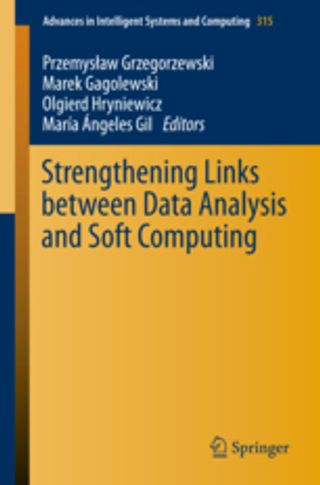?
The fuzzy representation of prior information for separating outliers in statistical experiments.
P. 167–174.
Броневич А. Г., Мацыпаев Д. А.
Ключевые слова: нечеткие множестваfuzzy setsdistortion functionsoutlierstriangular normsNeyman-Pearson criterion,Lipschitz continuityфункции искажениятриангулярные нормыкритерий Неймана-Пирсонанепрерывность по Липшицу
ПУБЛИКАЦИЯ ПОДГОТОВЛЕНА ПО РЕЗУЛЬТАТАМ ПРОЕКТА:
В книге

Vol. 315. , Dordrecht, L., Heidelberg, NY: Springer, 2015.
Шведов А. С., Свиязов В. А., В кн.: Системное моделирование социально-экономических процессов: труды 46-ой международной научной школы-семинара, г. Уфа, 9 - 15 октября 2023 г.: Воронеж: Истоки, 2024. С. 526–531.
Модель обобщенной авторегрессионной условной гетероскедастичности широко применяется для финансовых временных рядов. Имеются и дальнейшие обобщения этой модели. Одно из направлений для таких обобщений, это сочетание идей нечетких систем Такаги - Сугено и идей авторегрессионной условной гетероскедастичности. Преимущество нечетких систем Такаги - Сугено состоит в том, что для каждого нечеткого кластера (например, для нечеткого кластера "низкая ...
Добавлено: 26 июня 2024 г.
Springer, 2022.
Добавлено: 26 декабря 2022 г.
Шведов А. С., Discrete Mathematics and Applications 2022 Vol. 32 No. 2 P. 139–145
Добавлено: 31 мая 2022 г.
Omrani H., Alizadeh A., Эмрузнежэд А. и др., Expert Systems with Applications 2022 Vol. 189 Article 116021
Добавлено: 12 октября 2021 г.
Springer, 2021.
Книга вклюает в себя работы 16ой международной конференции по Анализу формальных понятий. Книга поделена на 5 секций: теория, правила, методы и приложения, исследование и визуализация ...
Добавлено: 10 июля 2021 г.
Stonyakin F. S., Алкуса М., Титов А. А. и др., , in: Mathematical Optimization Theory and Operations Research, 18th International Conference, MOTOR 2019 Ekaterinburg, Russia, July 8–12, 2019Vol. 11548.: Springer, 2019. P. 82–96.
Добавлено: 29 октября 2020 г.
Шведов А. С., Automation and Remote Control 2020 Vol. 81 No. 7 P. 1279–1285
Добавлено: 26 сентября 2020 г.
Шведов А. С., Автоматика и телемеханика 2020 № 7 С. 139–147
Результат о существовании равновесного в смысле Байеса -- Нэша профиля чистых стратегий для симметричных игр с неполной информацией класса "война на изнурение" обобщается для случая, когда действия и типы игроков могут быть нечеткими. ...
Добавлено: 26 сентября 2020 г.
Фролов Д. С., Миркин Б. Г., Nascimento S. и др., , in: Fuzzy Systems (FUZZ-IEEE), IEEE International Conference Proceedings.: IEEE, 2019. P. 1–6.
Добавлено: 30 октября 2019 г.
P.: Atlantis Press, 2019.
Добавлено: 25 сентября 2019 г.
Savchenko L.V., Savchenko A.V., Journal of Communications Technology and Electronics 2019 Vol. 64 No. 3 P. 238–244
Добавлено: 7 июня 2019 г.
Савченко А. В., Савченко Л. В., Радиотехника и электроника 2019 Т. 64 № 3 С. 274–280
Исследован фонетический подход для систем обработки голосовой информации. Разработан метод автоматического распознавания речевых сигналов, в котором каждому квазистационарному сегменту ставится в соответствие нечеткое множество фонем. Предложено использовать операцию вероятностной треугольной нормы для нечетких множеств, соответствующих входному фрейму и ближайшей к нему эталонной фонемы. Экспериментально показано, что разработанный метод позволяет на 1.5…5% снизить вероятность ошибочного распознавания ...
Добавлено: 18 марта 2019 г.
Cham: Springer, 2018.
Добавлено: 10 ноября 2018 г.
Савченко А. В., Белова Н. С., Savchenko Lyudmila V., Optical Memory and Neural Networks (Information Optics) 2018 Vol. 27 No. 1 P. 23–31
Добавлено: 9 февраля 2018 г.
Романюк К. А., Финансы и кредит 2015 Т. 21 № 24 С. 45–53
Предмет/тема. В статье отмечается, что за прошедшие годы сектор потребительского кредитования активно развивался. Только за 2011 и 2012 гг. он вырос на 35,9 и 39,4% соответственно, что превышает данный показатель по другим направлениям банковской деятельности. В частности, сектор корпоративного кредитования за те же годы увеличился на 26 и 12,7% соответственно. Подобная тенденция делает особенно актуальной ...
Добавлено: 20 ноября 2017 г.
Cham: Springer, 2018.
This volume constitutes the proceedings of two collocated international conferences: EUSFLAT-2017 – the 10th edition of the flagship Conference of the European Society for Fuzzy Logic and Technology held in Warsaw, Poland, on September 11–15, 2017, and IWIFSGN’2017 – The Sixteenth International Workshop on Intuitionistic Fuzzy Sets and Generalized Nets, held in Warsaw on September ...
Добавлено: 5 октября 2017 г.
Есаулов Д. М., Mathematical Methods of Statistics 2013 Vol. 22 No. 4 P. 333–349
Добавлено: 19 октября 2016 г.
Boldin M. V., Есаулов Д. М., Moscow University Mathematics Bulletin 2014 Vol. 69 No. 1 P. 29–32
Добавлено: 17 октября 2016 г.
Болдин М. В., Есаулов Д. М., Вестник Московского университета. Серия 1: Математика. Механика 2014 № 1 С. 46–50
В статье исследуется локальная качественная робастность GM-тестов в авторегрессии против выбросов. Рассматривается локальный вариант схемы засорения данных независимыми аддитивными выбросами интенсивности O(n -1/2)<img /><img /><img /><img /><img /><img /><img /><img />, <img />n - объем данных. Качественная робастность формулируется в терминах равностепенной непрерывности мощности. Построены асимптотически оптимальные в максиминном смысле GM-тесты. ...
Добавлено: 17 октября 2016 г.